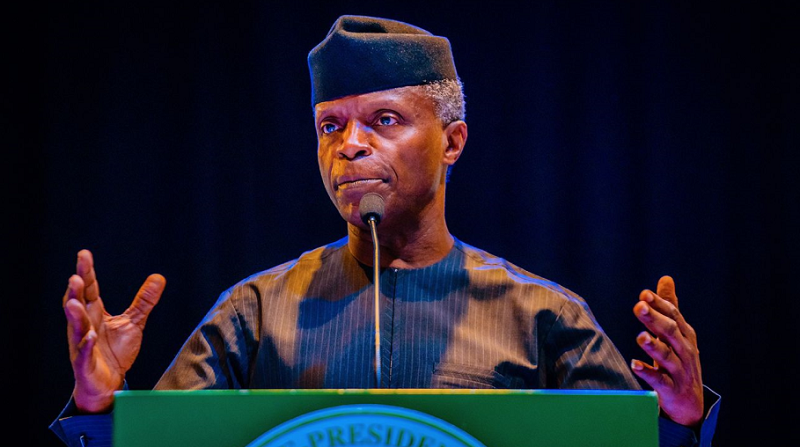Nigeria’s Vice President, Yemi Osinbajo has proposed a Debt-For-Climate (DFC) swap deal that will allow African countries to advance the course of global net-zero emissions targets and facilitate energy access.
The VP who made the proposal while delivering a lecture on a just and equitable energy transition for Africa at the Center for Global Development in Washington D.C said that “debt for climate swaps is a type of debt swap where bilateral or multilateral debt is forgiven by creditors in exchange for a commitment by the debtor to use the outstanding debt service payments for national climate action programs.
According to him, the creditor country or institution agrees to forgive part of a debt, provided the debtor country would pay the avoided debt service payment in a local currency into an escrow or any other transparent fund and the funds must then be used for agreed climate projects in the debtor country.”
While Justifying his position on the debt swap deal, Osinbajo said that the commitment to it would “increase the fiscal space for climate-related investments and reduce the debt burden for participating developing countries.
The global carbon market
The Vice President used the opportunity to propose what he described as greater participation of African countries in the Global Carbon Market while exploring financing options for the energy transition.
He said that there is a need to take a comprehensive approach in working jointly towards common goals, including the market and environmental opportunities presented by the financing of clean energy assets in growing energy markets.
Read also: Flooding: UNICEF says three million children risk diseases, infection in Pakistan
The VP explained that in addition to conventional capital flows both from public and private sources, it is also essential that Africa can participate more fully in the global carbon finance market.
Speaking further, he said that direct carbon pricing systems through carbon taxes have largely been concentrated in high and middle-income countries.
He however noted that carbon markets can play a significant role in catalyzing sustainable energy deployment by directing private capital into climate action, improving global energy security, providing diversified incentive structures, especially in developing countries, and providing an impetus for clean energy markets when the price economics looks less compelling – as is the case today.
The VP encouraged developed countries to as a matter of urgency, support the African continent to develop into what he described as a global supplier of carbon credits, ranging from biodiversity to energy-based credits,” which would be a leap forward in aligning carbon pricing and related policy around achieving a just transition.
Osinbajo noted that the central thinking for most developing countries is that Africa is confronted on this issue of a just transition with two, not one, existential crises, the climate crisis and extreme poverty. This is as he tried to address the concerns of the African continent and other developing countries regarding a just transition.
“Nearly 90 million people in Asia and Africa who had previously gained access to electricity can no longer afford to pay for their basic energy needs,” the VP said. “The inflationary pressures caused by the COVID-19 pandemic and other macroeconomic trends have been further exacerbated by the ongoing war in Ukraine”.
“Countries worldwide have been hit by record prices on all forms of energy. Power prices are breaking records across the globe, especially in countries or markets where natural gas plays a key role in the energy mix.”
Osinbajo sounded a note of caution, saying that “in such a global reality, limiting financing of gas projects for domestic use would pose a severe challenge to the pace of economic development, delivery of electricity access and clean cooking solutions, and the scale-up and integration of renewable energy into the energy mix.”
Nigeria’s energy transition plan
On efforts made by Nigeria to combat the unfolding crisis, Osinbajo noted that the country had established the Energy Transition Plan designed to tackle the dual crises of energy poverty and climate change and deliver SDG-7 by 2030 and net-zero by 2060 while centring on the provision of energy for development, industrialization, and economic growth.
He maintained that natural gas plays a huge role in the short-medium term to facilitate the establishment of baseload energy capacity and address the nation’s clean cooking deficit in the form of LPG.
“We anchored the plan on key objectives including lifting 100 million people out of poverty in a decade, driving economic growth, bringing modern energy services to the full population and managing the expected long-term job losses in the oil sector due to global decarbonization.”
The VP further identified what he described as double standards evident in the response to the current energy crisis by many countries in the global North. He stated that the one billion people in Sub-Saharan Africa, apart from South Africa, are serviced by an installed capacity of just 81 gigawatts.
He explained that while Sub-Saharan Africa has contributed, based on information that is already out there, less than one per cent of cumulative CO.2 2 emissions, the United States has an installed capacity of 1,200 gigawatts to power a population of 331 million people, while the United Kingdom has 76 gigawatts of installed capacity for its 67 million people.
“The per capita energy capacity in the United Kingdom is almost fifteen times than in Sub-Saharan Africa,” he said. “Many of these countries had barely a year ago seriously advocated or implemented policies on limiting public funding for fossil fuel projects in developing countries, making no distinction between upstream oil and coal exploration, and gas power plants for grid balancing”.
He noted that with the Kigali communique and several other formal and informal consultations, African nations are now happily more intentional in taking joint ownership of our transition pathways and designing climate-sensitive strategies that address our growth objectives. This is what Nigeria has done with our Energy Transition Plan.
Story was adapted from Channels TV.
